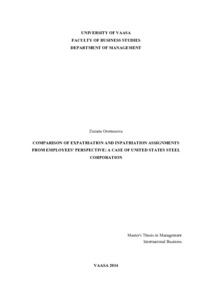Comparison of Expatriation and Inpatriation Assignments from Employees' Perspective: A Case of United States Steel Corporation
Orémušová, Zuzana (2014)
Kuvaus
Opinnäytetyö kokotekstinä PDF-muodossa.
Tiivistelmä
Purpose: In order to succeed in a globalizing marketplace and gain competitive advantage over their competitors, multinational corporations often use expatriate and inpatriate assignments. There are existing theories and guidelines on how to effectively manage these assignments, however, corporations not always adhere to them. Moreover, they often fail to recognize different needs of expatriates and inpatriates. This thesis therefore aims to examine how United States Steel corporation manages its expatriate and inpatriate assignments from the perspective of these employees, and offer improvement of these practices based on empirical evidence.
Design/methodology/approach: The thesis reviews existing research on international assignment management and cultural theories. For the data collection, qualitative approach was used, with semi-structured interviews carried out with five expatriates and five inpatriates. Respondents' answers were then compared and contrasted to the theoretical framework of ideal international assignment management.
Findings: The results show that while prior to assignment, U. S. Steel shows enough support and proper preparation of its employees for their stay abroad, this activity is less prominent during the stay, and almost entirely missing during the repatriation process. The company does not seem to utilize the knowledge its employees gained during their assignment very well. Similarly, quite large differences were observed in company's management of expatriates and inpatriates; the expatriates were receiving far more support and guidance than inpatriates.
Research limitations/implications: Since this thesis is carried out as a case study, its results have limited applicability to other companies' cases. Similarly, generalizations cannot be drawn based on results of this thesis. However, it has direct implications for U. S. Steel, which can improve its international assignment management based on the suggestions of its employees
Originality/value: This thesis offers a look at international assignment management from an employee perspective, and brings directly applicable results for U. S. Steel.
Design/methodology/approach: The thesis reviews existing research on international assignment management and cultural theories. For the data collection, qualitative approach was used, with semi-structured interviews carried out with five expatriates and five inpatriates. Respondents' answers were then compared and contrasted to the theoretical framework of ideal international assignment management.
Findings: The results show that while prior to assignment, U. S. Steel shows enough support and proper preparation of its employees for their stay abroad, this activity is less prominent during the stay, and almost entirely missing during the repatriation process. The company does not seem to utilize the knowledge its employees gained during their assignment very well. Similarly, quite large differences were observed in company's management of expatriates and inpatriates; the expatriates were receiving far more support and guidance than inpatriates.
Research limitations/implications: Since this thesis is carried out as a case study, its results have limited applicability to other companies' cases. Similarly, generalizations cannot be drawn based on results of this thesis. However, it has direct implications for U. S. Steel, which can improve its international assignment management based on the suggestions of its employees
Originality/value: This thesis offers a look at international assignment management from an employee perspective, and brings directly applicable results for U. S. Steel.
